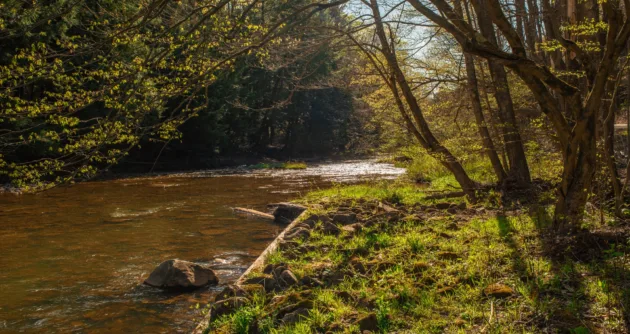Less than 24 hours after a voter landslide enacted a ban on hydraulic fracturing in the city of Denton, Texas, the Texas General Land Office and the Texas Oil and Gas Association sued to nullify the election.
Let’s break that down. By a 59-41 percent margin, voters chose to adopt the ban on fracking despite being outspent ten-to-one by an industry-funded local front-group opposing the measure. On the day following the election, not satisfied with having lost to the will of the people, the State of Texas, through its state agency, teamed up with a corporate industry group, the Texas Oil and Gas Association, to challenge the people’s right to decide whether or not fracking poses a threat to the rights of the community. Even before the first vote was cast, corporations and the state, knowing the people had lost patience with state-permitted corporate rights violations, planned to gang up on citizens, adding insult to injury by asking the courts to strip them of the power to govern what harm corporations can do under color of law.
It’s a farce being performed across the country.
In November 2012 the people of the City of Broadview Heights, Ohio, went to the polls and by a 67 percent margin enacted a Community Bill of Rights (BoR) charter amendment codifying the right to clean air, pure water, a sustainable energy future, the right to local self-government, of natural communities and ecosystems, the peaceful enjoyment of home, and a ban on any new extraction of oil and gas within the City as a protection of these rights. Here’s a residential suburb of Cleveland that has already endured the siting of at least ninety drill rigs in back yards, on church land and next to playgrounds, and they decided enough was enough.
The managers of Bass Energy and Ohio Valley Energy Systems et al. decided the people who have to live with their disruptive and harmful profit-taking had no right to make this decision. In June of 2014 they sued to reverse the election and overturn the citizen-initiated law. They called on the court to defend the power of the state to preempt local authority to protect community rights. And they went further, asking the court to judge the Community Bill of Rights to be a violation of the corporations’ civil rights under the 5th amendment.
In April 2013 the Mora County, New Mexico, Board of Supervisors enacted the Mora County Community Water Rights and Local Self-Government Ordinance. Like the Broadview Heights charter amendment, Mora County’s ordinance enumerated certain rights belonging to the community, focusing on the right to water, and in that same ordinance banned the extraction of hydrocarbons within the County to protect those rights.
Two lawsuits were soon brought against the County. In November 2013, the Independent Petroleum Institute – a corporate front group – along with an individual owning .75 acres in the County filed a civil rights complaint, claiming the Mora Bill of Rights violates the rights guaranteed corporations and people under the first, fifth and fourteenth amendments of the U.S. Constitution. Then in January 2014 SWEPI Delaware Limited Partnership, a subsidiary of Royal Dutch Shell with principle business offices in Houston, Texas, sued Mora, asking the court for declaratory and injunctive relief, as well as damages, claiming the County had violated the corporation’s first, fifth and fourteenth amendment civil rights protections as well as the Supremacy Clause of the U.S. Constitution.
In November, 2013, the people of the City of Lafayette, Colorado, voted by a 57% majority to amend their city charter to include a Community Bill of Rights and to protect those rights by banning fracking and related activities. Adoption of the measure succeeded despite the City Council’s public opposition, a legal challenge to the petitions to place the measure on the ballot, and a pot of opposition money thrown at its defeat by the Colorado Oil and Gas Association (COGA). It didn’t take long – on December 3, 2013 the COGA, a corporate “non-profit,” sued the City of Lafayette on behalf its corporate members, claiming the State of Colorado had forbidden municipalities from enacting local laws that conflict with the intent of the General Assembly, which “has declared it to be in the public interest to permit each oil and gas pool in Colorado to produce up to its maximum efficient rate of production, subject to the prevention of waste and consistent with the protection of public health, safety, and welfare,” among other claims.
This case was decided by the Boulder County District Court on August 24, 2014, in favor of the corporations and against the citizens who enacted the measure. The court refused to allow the citizens’ group, East Boulder County United, to intervene in the case, ruling that the municipal corporation of Lafayette had the same interests as the people of the City. The City Council voted not to appeal the court’s decision to nullify the election.
We congratulate the people of Denton, Texas, and every community that has prohibited fracking. That said, the Denton ban, and a growing number of simple bans enacted elsewhere, have not specifically taken a stand against corporate violations of community rights “permitted” by state and federal governments.
We hope that future efforts by communities to protect themselves against state-enabled corporate assaults will frame the problem more precisely as a denial of democratic rights – as have Pittsburgh, Pennsylvania; Mountain Lake Park, Maryland; Mora County, New Mexico; Mendocino County, California; Athens, Ohio; Lafayette, Colorado; Wilkinsburg, Pennsylvania; Broadview Heights, Ohio, and dozens of other municipalities and Counties that have enacted Community Bills of Rights. Until many more communities refuse to accept the systemic denial of fundamental rights, state and federal law makers and the courts that enforce their mischief will continue to uphold the privileges of corporate wealth over the inalienable rights of people.
The Community Environmental Legal Defense Fund (CELDF) has assisted close to 200 communities to enact Community Bills of Rights, spearheading the Community Rights Movement’s head-on confrontation with illegitimately bestowed corporate “rights” when those legal privileges violate inalienable and fundamental rights of human and natural communities. CELDF partnered with and advised the first communities in the U.S. to establish the Rights of Nature in law, and to elevate the rights of communities above the privileges of wealthy corporations. To protect community and ecosystem rights, CELDF-drafted local laws have included bans on fracking and related activities, factory farming, water privatization, toxic landfills, genetically modified organisms, privatization of public resources, services and electoral processes, stripping of worker rights on the job, and other corporate assaults.


